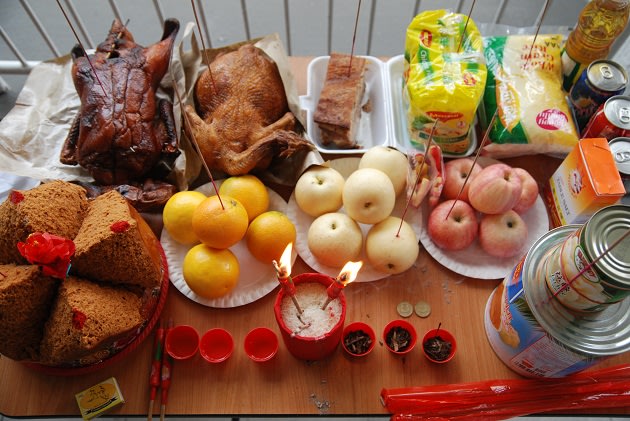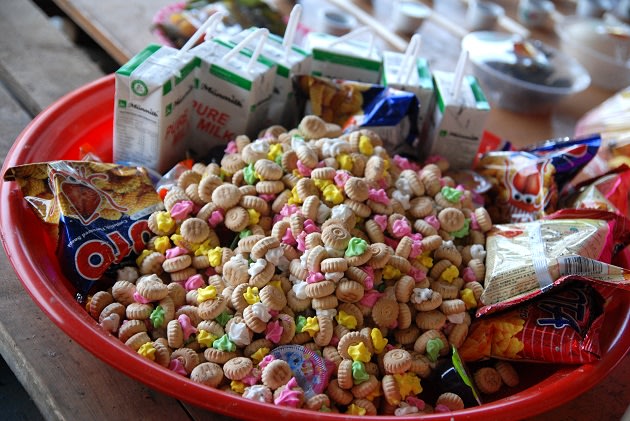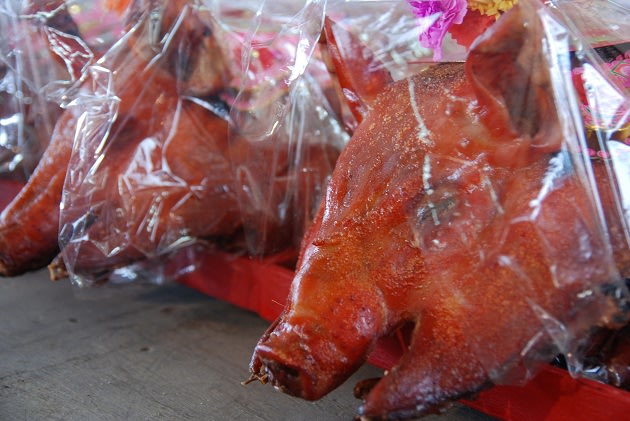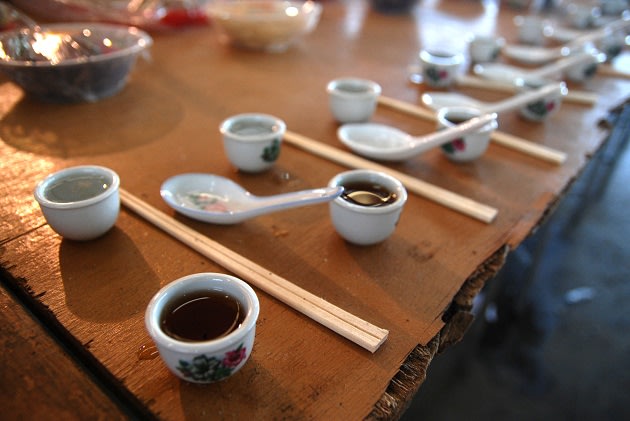Text and images by Sheere Ng
 Standard offering
Standard offering
The Hungry Ghost Festival, a Chinese tradition of feeding the wandering spirits during the seventh month of the lunar calendar, began last Friday (the 16th of August) and will last for a month. Hence the feast is on again – meats, fish, fruits, cakes, alcohol for the wandering souls and a separate menu of milk, sweets and tidbits for the “young spirits”. As with tradition, the ghosts get to tuck in first, before the living could be offered its “earthly” leftovers.
 Sweets for the lost young spirits
Sweets for the lost young spirits
“This festival is an expansion of Zhong Yuan, the birthday of the ‘Earth’s Official’, who pardons the sins of the dead”, says Mr Chung Kwang Tong, secretary general of the Taoist Federation. (Buddhist refers this day as Yulanpen, which has a different origin.)
Traditionally on the 15th day of the seventh month, Taoist priests would chant the scriptures, urging the spirits to repent, adds Mr Chung. During the ritual, they also “offered” buns and rice – the traditional and ancient Chinese staples. But over the years, the commoners and peasant folks reinterpret it on a grander scale, believing that the more and better food offered, the likelier their ancestors would be satisfied and thus seek forgiveness. They also extend their offerings to the spirits who have no kith and kin with the hope that they will not wreak havoc to their lives.
When it comes to the food selection, it’s the same general rules when offering a fellow living human – only fresh cooked foods make it to the offering table. “You wouldn’t give rotten fruits to your father would you?” says Mr Chung.
Mr Zhang Zai Xing, who is in charge of the Pasir Panjang Wholesale Centre’s sacrificial ceremony, says that they would prepare necessities that would also be of use to the centre’s members, since the offerings will be redistributed back to them. Therefore, practical stuff like salt, condensed milk, canned food and packet drinks, among others, are the norm.
 Practical food offerings at the Pasir Panjang Wholesale Centre
Practical food offerings at the Pasir Panjang Wholesale Centre
While there isn’t an edict to follow, there are certain unspoken rules that any believer must abide by, as they had been practiced for centuries by the Chinese around the world.
For example, animal sacrifices come in threes – one that thrives on land (e.g. pork), in the air (e.g. chicken, to represent birds) and in water (e.g. seafood, especially fish). According to Mr Chung, they represent the three realms of existence – heaven, earth, and the netherworld.
 Suckling Pigs
Suckling Pigs
While most fruits are accepted, from the humble apples and oranges to the fancier, recent additions like dragonfruit and kiwi, Mr Chung cautions that the dead may not share the living’s liking for pungent fruits like durian (it is an acquired taste even for humans after all).
Chinese rice wine and tea are the de facto beverages, since they are an old time Chinese favourite meal accompaniments. But businessmen with fatter budgets have been known to offer expensive liquor like brandy and whiskeys.
 Tea and wine are the de facto beverages
Tea and wine are the de facto beverages
Mr Ron Zhuang, who’s in the construction business, offers beers and brandy, on top of the suckling pig, roast pork, roast chicken, fish, crabs and a buffet spread of six to eight more dishes. When asked what they wish to receive in return for the feast, he says, “Besides good luck, we also hope for safety, which is very important in our business.”
There are also less observant believers. Folks are known to offer unconventional items like a Macdonald’s meal. So long as they believe it will please, it will be done.
Devotees also offer “material offerings” by burning paper mache versions of cars, money, houses, toilets, maids and even iphones (the list goes on). But food must never be implied with paper, as the spirits actually “consume” them, albeit in a different manner. According to Mr Eric Yeo, a practicing Taoist priest, “They eat by smelling, not by swallowing.”


No comments:
Post a Comment